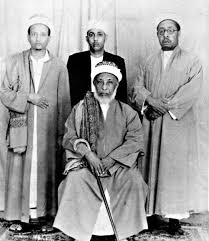Zanzibar — A Storehouse of the Awliyāʾ
To walk through Zanzibar is to breathe in a city that is more than stone and spice. It is a storehouse of the awliyāʾ, men and women whose baraka still lingers in the alleyways, the mosques, and the seafront air. Among these, the Ba ʿAlawi Saadat — descendants of the Prophet ﷺ — stand out as pillars who carried Islam into the Swahili world not by sword or decree, but by teaching, trading, guiding, and healing.

It was here that Sayyid Abubakr Ahmad Sumayṭ, the first Qāḍī of Zanzibar, fathered a legacy of knowledge and justice. His son, al-Ḥabīb ʿUmar ibn Ahmad Sumayṭ, continued that work, ensuring that the lineage of faith remained alive in the courts, mosques, and homes of the island. Their mausoleums remain places of quiet visitation, where one feels the weight of continuity — fathers and sons, generation after generation, serving as lanterns for the community.
Opening with Fātiḥa — Why It Matters
When I began my book Incense, Dhikr, Incense and Poetry, I placed the Fātiḥa upon this noble lineage. This was not formality but recognition. To mention the Ba ʿAlawi is to acknowledge the soil from which our Islam in East Africa has grown. They are not distant figures in history books; they are the roots beneath our feet.
Affirming the Awliyāʾ — The Darqāwī Reminder
As Shaykh Moulay al-ʿArabi al-Darqāwī, founder of the Darqāwiyya branch of the Shādhiliyya, reminded in his letters:
“Affirmation of the Path is itself wilāya.”
This affirmation of God’s friends is also the essence of the Ba ʿAlawi mission. It is why Abdul Hakim Murad (Timothy Winter) repeatedly stresses in his works and lectures that recognizing the awliyāʾ is itself a recognition of God. And it is why contemporary voices like Michael Sugich, in his luminous book Signs on the Horizons: Meetings with Men of Knowledge and Illumination, draw our gaze back to these men of God, such as Imam al-Mashhūr al-Ḥaddād, to remind us that sainthood is alive and accessible.
Imam al-Ḥaddād — Renewal for the Common Soul
Among the anchors of this chain is Imam ʿAbdallah ibn ʿAlawi al-Ḥaddād (d. 1720), the Qutb al-Daʿwa wa al-Irshād. Though blind in sight, he illuminated the world with works that distilled Islam’s ocean into drinkable streams for ordinary believers. His Ratib al-Ḥaddād is still recited in East Africa’s mosques and homes, weaving together Hadramawt and the Swahili coast in a single rhythm of remembrance.
Abdul Hakim Murad has reflected on Imam al-Ḥaddād as a renewer whose writings speak across centuries. Michael Sugich too, in Signs on the Horizons, reminds us that the Ba ʿAlawi Saadat live not only in history but in living presence — in men like Imam al-Mashhūr al-Ḥaddād, or Sayyid ʿUmar ibn ʿAbdallah, whose very company became a teaching.
The Lineage in East Africa — Ibn Sumayṭ & Beyond
The Ba ʿAlawi presence blossomed on the coast through men like Sayyid Abubakr ibn Sumayṭ in Comoros and Zanzibar, whose teaching and writings anchored a generation during times of colonial disruption. These were men who carried prophetic gentleness into everyday life — reminding merchants of honesty, praying over the sick, whispering duʿāʾ for rulers, and carrying Islam not as an ideology but as character.
This is why East Africa is not merely a recipient of Ba ʿAlawi light but a branch of its great tree. The mausoleum of Sayyid Abubakr ibn Sumayṭ still stands near the venue of our upcoming poetry reading — and visiting it will be part of how we anchor our remembrance in both word and presence.
The Poetry Prize — Honoring in Verse
To honor this lineage, we are inaugurating the Al habib Sumayt, Mwinyi Baraka, and Omar Qullatein Poetry Prizes, in conjunction with Haroon Sugich, student of Sayyid Omar ibn Abdallah otherwise known as Mwinyi Baraka. This initiative invites voices of today to remember voices of yesterday.
Entry Guidelines:
- Submit one poem only.
- Written in stanza form.
- Must be an elegy honoring the great men spoken of here — the Ba ʿAlawi Saadat, the Sumayṭs, Imam al-Ḥaddād, and their heirs.
🔗 Enter the Prize through this link: Poetry Prize Submission Form (insert live link).
On the evening of the reading, alongside the recitations, we will also walk to the mausoleum of Sayyid Abubakr ibn Sumayṭ, making our words not just speech but pilgrimage — poetry as ziyāra.
Closing Call
To celebrate the Ba ʿAlawi Saadat is not to worship ancestry; it is to recognize an inheritance of light. Zanzibar itself bears witness — a city of saints, a storehouse of baraka, a place where the Ahl al-Bayt left footprints that still glow.
By placing the Fātiḥa at the beginning of my work, and by honoring them with gatherings of poetry and remembrance, I hope — even faintly — to catch a whiff of the sand they walked on. And perhaps, in our own lives, we may carry forward a trace of their fragrance.
May Allah make us true heirs of their example.


Your blog is a true hidden gem on the internet. Your thoughtful analysis and in-depth commentary set you apart from the crowd. Keep up the excellent work!
Thank you please visit for more posts